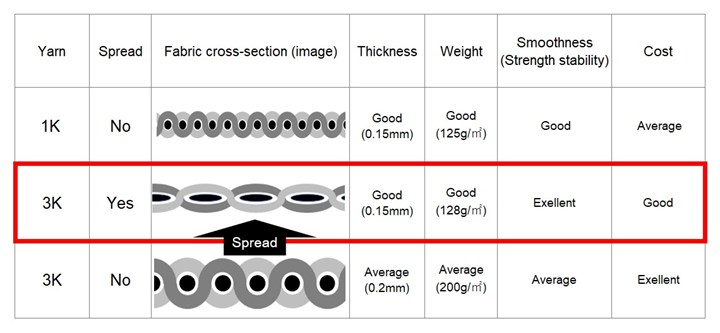Teijin unveils novel spread-tow carbon fiber woven fabric
3K woven fabric developed via Teijin’s tow-spreading technology is as thin as 1K wovens and nearly the same weight, but is said to require less cost to produce, and offers better strength stability.

Photo Credit: Teijin Ltd.
Teijin (Tokyo, Japan) has launched a lightweight, strong and cost-effective carbon fiber woven fabric developed with the company’s proprietary tow-spreading technology.
The new woven fabric is made with 3K (3,000) carbon fiber filament yarn for applications requiring low weight and design flexibility, such as automotive interior materials and sporting goods. Teijin, using its in-house tow-spreading technology, succeeded in thinning the 3K fabric from a molding thickness of 0.2 mm to approximately 0.15 mm, the same as that of 1K woven fabric, when molded into carbon fiber-reinforced plastic (CFRP).
Thanks to the flat undulations of the fabric’s intersecting yarns, CFRP made with Teijin’s new fabric is said to offer improved smoothness. This, according to Teijin’s in-house research, results in more stable strength compared to CFRP made with 1K carbon fiber woven fabric. In addition, the company says its proprietary tow-spreading technology lowers the fabric cost below that of conventional 1K woven fabric, and, despite using 3K yarn (200g/m2), Teijin reduced the weight by 35%, similar to fabric made with 1K yarn (125g/m2).
Teijin plans to market the woven fabric to manufacturers of industrial and sports products. Together, with the other spread-tow carbon fiber woven fabrics in the Teijin portfolio, the company is targeting sales of JPY 2 billion (approx. $17.4 million) in fiscal 2030.
Related Content
-
3D-woven composites find success in aerospace, space
CAMX 2024: Bally Ribbon Mills experts are displaying the company’s various joints, thermal protection system (TPS) technologies and other 3D woven composites for mission-critical applications.
-
PEEK vs. PEKK vs. PAEK and continuous compression molding
Suppliers of thermoplastics and carbon fiber chime in regarding PEEK vs. PEKK, and now PAEK, as well as in-situ consolidation — the supply chain for thermoplastic tape composites continues to evolve.
-
Highly tunable, woven lattice reinforcements target automotive structures
CAMX 2023: Startup Weav3D will be demonstrating its two collaborative automotive demonstrator parts and present two conference papers.













